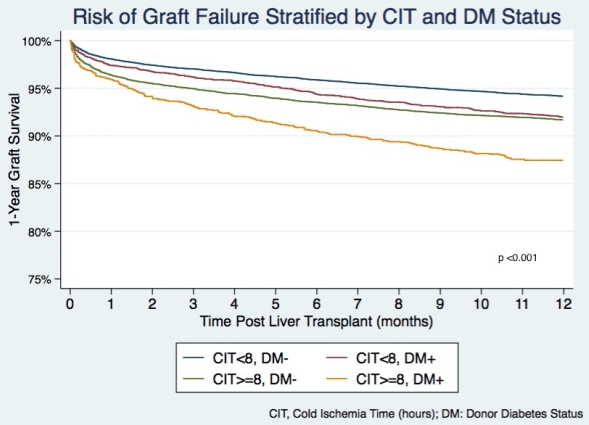Diabetes Mellitus Status of the Donor and Prolonged Cold Ischemia Time Have a Synergistic Negative Effect on Graft Survival After Liver Transplantation.
1Surgery, University of Massachusetts Medical Center, Worcester
2Surgery, University Medical Center Groningen, Groningen, Netherlands.
Meeting: 2016 American Transplant Congress
Abstract number: B169
Keywords: Liver transplantation
Session Information
Session Name: Poster Session B: Kidney Issue in Liver Transplantation
Session Type: Poster Session
Date: Sunday, June 12, 2016
Session Time: 6:00pm-7:00pm
 Presentation Time: 6:00pm-7:00pm
Presentation Time: 6:00pm-7:00pm
Location: Halls C&D
Background: Both prolonged cold ischemia time (CIT) and a history of diabetes mellitus (DM) in the donor are associated with reduced graft survival after liver transplantation. However, it is unknown whether these two risk factors act synergistically. The purpose of this study was to determine whether posttransplant graft survival of livers obtained from diabetic donors is more affected by prolonged CIT than that of livers from donors without DM.
Methods: A retrospective analysis was performed based on data from 50,253 adult liver transplant recipients obtained from the Scientific Registry of Transplant Recipients database (2002-2015). Multi-organ transplants, re-transplantation, living donors and patients with acute liver failure were excluded. We conducted a multivariable Cox Regression survival analysis to asses the risk of graft failure within one year after transplantation using each possible combination of donor DM status: yes/no (n=5,565/n=44,688) and CIT <8/≥8 hr (n=33,879/n=16,374) as the primary exposure variable, while adjusting for donor, recipient, and transplant factors.
Results: One-year graft survival of livers from donors without DM and a CIT <8 hr was approximately 94%. As expected, both DM and a CIT≥8 hr were associated with reduced graft survival (HR of 1.18 and 1.44 respectively, p<0.001). However, the combination of donor DM and a CIT ≥8 hr let to a much higher risk of graft failure than these individual risk factors alone. One-year graft survival of livers from diabetic donors and with a CIT ≥8 hr was approximately 88% and the HR increased to 1.88 (p<0.001). 
Conclusion: Liver grafts from diabetic donors are more susceptible to a prolonged CIT than livers from non-diabetic donors. This new finding should be taken into consideration when allocating liver grafts from DM donors.
CITATION INFORMATION: Brüggenwirth I, Dolgin N, Martins P, Movahedi B, Ahearn A, Porte R, Bozorgzadeh A. Diabetes Mellitus Status of the Donor and Prolonged Cold Ischemia Time Have a Synergistic Negative Effect on Graft Survival After Liver Transplantation. Am J Transplant. 2016;16 (suppl 3).
To cite this abstract in AMA style:
Brüggenwirth I, Dolgin N, Martins P, Movahedi B, Ahearn A, Porte R, Bozorgzadeh A. Diabetes Mellitus Status of the Donor and Prolonged Cold Ischemia Time Have a Synergistic Negative Effect on Graft Survival After Liver Transplantation. [abstract]. Am J Transplant. 2016; 16 (suppl 3). https://atcmeetingabstracts.com/abstract/diabetes-mellitus-status-of-the-donor-and-prolonged-cold-ischemia-time-have-a-synergistic-negative-effect-on-graft-survival-after-liver-transplantation/. Accessed March 2, 2026.« Back to 2016 American Transplant Congress
